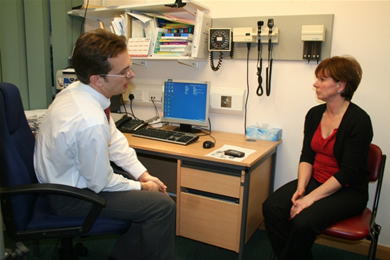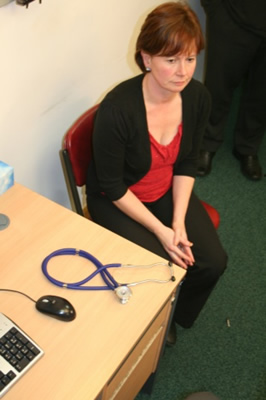Interpreting Family Histories and Identifying Patients Part 1 course for GPs


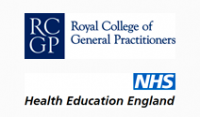
This is the first of three sessions that consider interpreting family histories and identifying patients with, or at risk of, a genetic condition. Here we cover autosomal single gene conditions.
This session was reviewed by Khyati Bakhai and last updated in January 2019.
Learning Objectives
By the end of this session you will be able to:
- Recognise autosomal dominant and autosomal recessive patterns of inheritance
- Interpret a family history/family tree
- Describe how genetic probability is estimated for autosomal dominant and recessive conditions
- Explain that the symptoms and signs of genetic conditions vary, especially in autosomal dominant conditions (variable expression and penetrance)
This session will give you the opportunity to explore how to use family history and knowledge of inheritance patterns to identify patients with, or at risk of, autosomal single gene conditions.
Before commencing this session you should complete sessions:
- Why Does Genetics Matter in Primary Care Practice? (400-0079)
- Taking and Drawing a Genetic Family History – Theory (400-0080)
- Taking and Drawing a Genetic Family History – Scenario (400-0081)
Michelle has over fifteen years of experience within the field of genetics and genomics education, previously working at the UK’s National Genetics Education and Development Centre.
She supports the work of the Genomics Education Programme by providing educational and clinical expertise through resource production, leading curricular development for specialist workforce training and driving the wider NHS workforce transformation in genomics.
Previously Michelle has supported the genetics education of medical professionals throughout their training, developing a large range of genetics educational resources currently used by non-genetics specialty trainees.
She also has extensive experience in teaching genetics and genomics to undergraduate medical and nursing students as well as General Practice specialty trainees.
Michelle has a background in molecular biology and Genetic Counselling and a PhD in the field of genetics education. She currently sits on the Council of the British Society for Genetic Medicine.
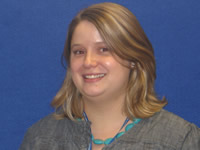
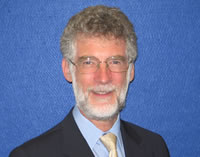
Peter Farndon has retired from his longstanding clinical, teaching, research, policy development and committee roles in genetics but is still actively involved in the British Society for Genetic Medicine.
Formerly Professor of Clinical Genetics and Consultant Clinical Geneticist in Birmingham, Peter was involved with the practical application of genetics for patients for nearly 25 years. He has had a long standing interest in genetic education, and in 2004 set up the NHS National Genetics Education and Development Centre, leading the team as the Centre’s director.
Catherine Bennett is an experienced educator with a background in higher education and the NHS and extensive experience in faculty development. Her key interests focus around learning and the health professions, particularly enhancing learning and teaching through curriculum and teacher development. Catherine provides strategic academic leadership on faculty development at Warwick Medical School, as well as teaching postgraduate medical education modules.
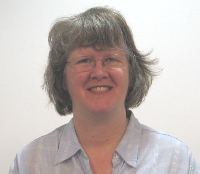
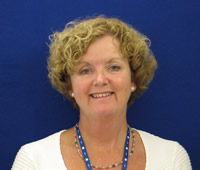
Candy worked for over 14 years in an academic capacity, teaching cancer and palliative care at undergraduate and post graduate level. She is particularly interested in supporting staff in all clinical settings to feel confident and competent to deliver the best care and to act as the patient’s advocate. She then moved into the field of genetics and managed the National Genetics Education Centre, whose key remit is to develop genetics knowledge and skills with non-genetics healthcare professionals. She has a wide publication and conference presentation profile.
- Business Management course for GPs
- Posted By eIntegrity Healthcare e-Learning
- Posted Date: 2024-11-18
- Location:Online
- This session examines how plans for services are made within an organisation. It introduces the busi...
- Financial Costs and Pressures course for GPs
- Posted By eIntegrity Healthcare e-Learning
- Posted Date: 2024-11-18
- Location:Online
- This session examines how resources are managed within financial constraints. It introduces basic fi...
- Providing Care Efficiently course for GPs
- Posted By eIntegrity Healthcare e-Learning
- Posted Date: 2024-11-18
- Location:Online
- This session examines ways in which clinical services and leadership can be delivered with greater e...
- NHS Structure and Healthcare Organisations course ...
- Posted By eIntegrity Healthcare e-Learning
- Posted Date: 2024-11-18
- Location:Online
- This session provides an overview of the National Health Service (NHS) in England as an organisation...
- Ethics and Equity in Planning Services course for ...
- Posted By eIntegrity Healthcare e-Learning
- Posted Date: 2024-11-18
- Location:Online
- This session will explore ethical and equity issues relating to the planning of services, such as eq...

